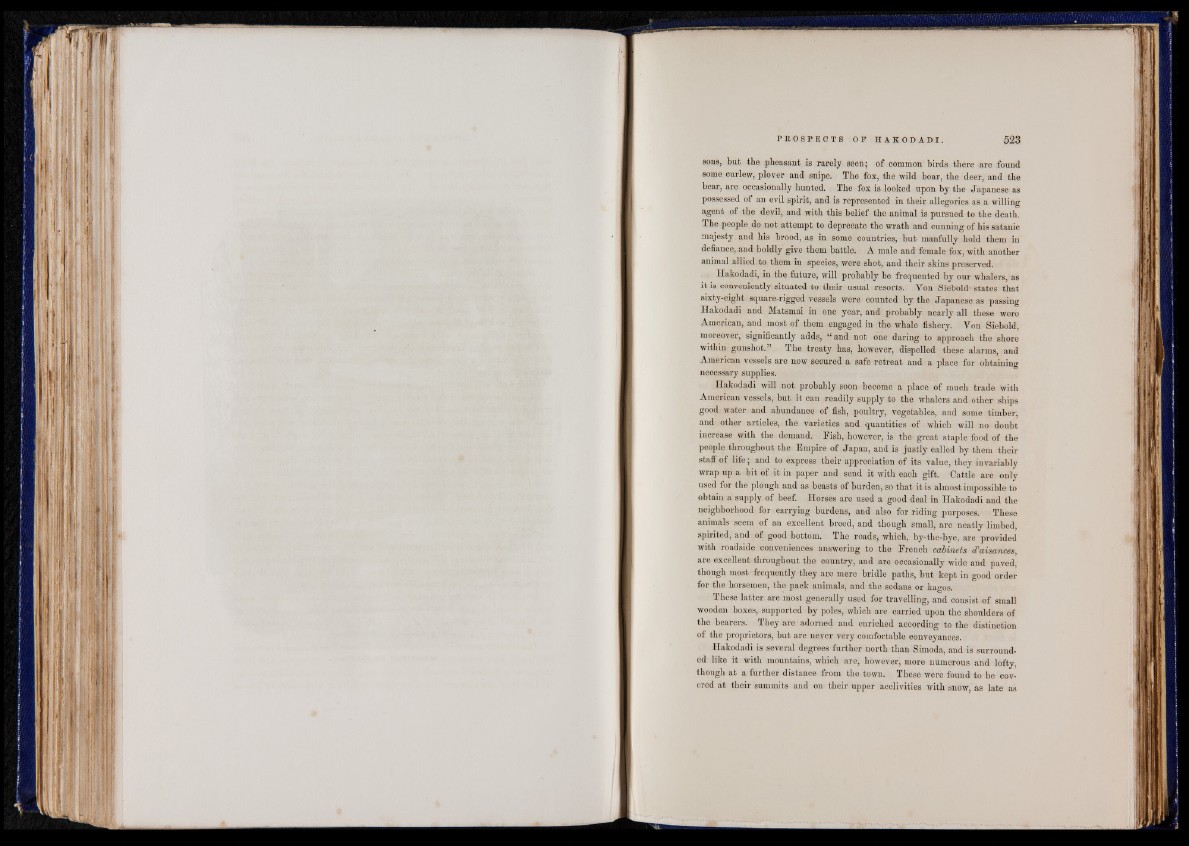
sons, but the pheasant is rarely seen; of common birds there are found
some curlew, plover and snipe. The fox, the wild boar, the deer, and the
bear, are occasionally hunted. The fox is looked upon by the Japanese as
possessed of an evil spirit, and is represented in their allegories as a willing
agent of the devil, and with this belief the animal is pursued to the death.
The people do not attempt to deprecate the wrath and cunning of his satanic
majesty and his brood, as in some countries, but manfully hold them in
defiance, and boldly give them battle. A male and female fox, with another
animal allied to them in species, were shot, and their skins preserved.
Hakodadi, in the future, will probably be frequented by our whalers, as
it is conveniently situated to their usual resorts. Yon Siebold states that
sixty-eight square-rigged vessels were counted by the Japanese as passing
Hakodadi and Matsmai in one year, and probably nearly all these were
American, and most of them engaged in the whale fishery. Von Siebold,
moreover, significantly adds, “ and not one daring to approach the shore
within gunshot.” The treaty has, however, dispelled these alarms, and
American vessels are now secured a safe retreat and a place for obtaining
necessary supplies.
Hakodadi will not probably soon become a place of much trade with
American vessels, but it can readily supply to the whalers and other ships
good water and abundance of fish, poultry, vegetables, and some timber,
and other articles, the varieties and quantities of which will no doubt
increase with the demand. Pish, however, is the great staple food of the
people throughout the Empire of Japan, and is justly called by them their
staff of life; and to express their appreciation of its value, they invariably
wrap up a bit of it in paper and send it with each gift. Cattle are only
used for the plough and as beasts of burden, so that it is almost impossible to
obtain a supply of beef. Horses are used a good deal in Hakodadi and the
neighborhood for carrying burdens, and also for riding purposes. These
animals seem of an excellent breed, and though small, are neatly limbed
spirited, and of good bottom. The roads, which, by-the-bye, are provided
with roadside conveniences answering to the French cabinets d’aisances,
are excellent throughout the country, and are occasionally wide and paved,
though most' frequently they are mere bridle paths, but kept in good order
for the horsemen, the pack animals, and the sedans or kagos.
These latter are most generally used for travelling, and consist of small
wooden boxes, supported by poles, which are carried upon the shoulders of
the bearers. They are adorned and enriched according to the distinction
of the proprietors, but are never very comfortable conveyances.
Hakodadi is several degrees further north than Simoda, and is surrounded
like it with mountains, which are, however, more numerous and lofty,
though at a further distance from the town. These were found to be covered
at their summits and on their upper acclivities with snow, as late as